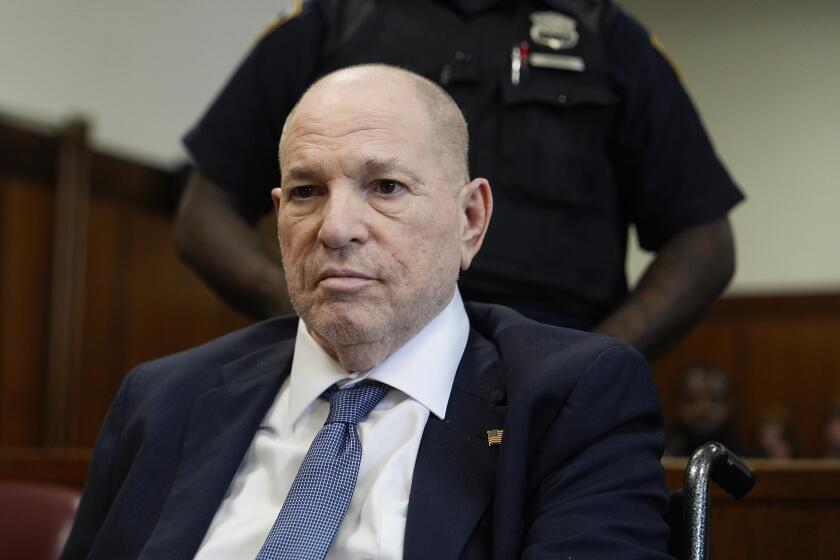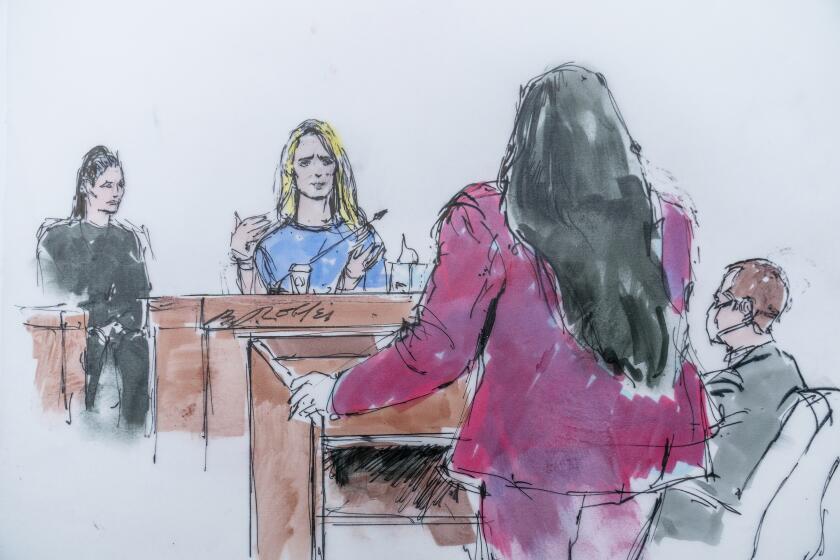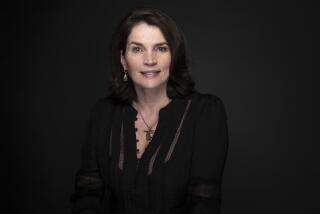Harvey Weinstein found guilty of sexual assault in New York retrial, acquitted on another charge

- Share via
Harvey Weinstein, the fallen Hollywood executive whose decades-long history of alleged sexual assault sparked the #MeToo movement and calls against workplace harassment across entertainment and beyond, was found guilty of one 2006 sexual assault but acquitted on another from the same year in the high-profile retrial of his sex crimes case in New York.
The majority-female jury handed down its split verdict after a week of deliberation. Weinstein was convicted in February 2020 of rape and a felony sex crime connected to individual allegations from accusers Jessica Mann and Mimi Haley, respectively. He was acquitted at the time on two charges of predatory sexual assault. A month later, he was sentenced to 23 years in prison.
A New York appeals court overturned Weinstein’s rape conviction in April 2024.
On Wednesday, he was convicted of forcing oral sex on Haley and acquitted of the same regarding former model Kaja Sokola. The jury was hung on a third charge of raping Mann in 2013, the Associated Press reported.
Harvey Weinstein, through his lawyer, is attempting to restore the old, hateful narrative of the ‘casting couch.’ The defense is trying to prove that the women testifying in his retrial willingly had sex with Weinstein to get work and then accused him to get money.
In closing arguments, which concluded June 4, Weinstein’s defense attorney Arthur L. Aidala downplayed his client’s alleged assaults as part of a “courting game” and said they were “transactional” exchanges of favors. According to Aidala, prosecutors were “trying to police the bedroom.”
Weinstein had become “the poster boy, the original sinner, for the #MeToo movement,” he added.
Prosecutor Nicole Blumberg took a different tone, throwing Aidala’s phrases back at the defense: “This was not a ‘courting game,’ as Mr. Aidala wants you to believe. This was not a ‘transaction.” “This was never about ‘fooling around.’ It was about rape,” she said.
In a statement to The Times on Wednesday, Haley’s attorney Gloria Allred celebrated the guilty verdict against Weinstein and commended her “very courageous” client. “Miriam is the shero of the Me Too movement. I admire her courage and have been honored to represent her,” Allred added.
In her statement, Haley thanked the jury, which she said “saw through the antics and nonsense” put forward by the defense. She said facing “constant disruptions, victim-shaming, and deliberate attempts to distort the truth was exhausting and, at times, dehumanizing.
“But today’s verdict gives me hope. Hope that there is a new awareness around sexual violence, and that the myth of the ‘perfect victim’ is fading,” Haley said. “I hope this result empowers others to speak out and seek justice.”
A legal representative for Weinstein did not immediately respond to The Times’ request for comment on Wednesday. A representative for Sokola also did not immediately respond.
Disgraced movie mogul Harvey Weinstein has been indicted on additional sex crimes charges ahead of his retrial in New York.
Weinstein’s retrial began April 23 and featured emotional testimony from former Weinstein Co. production assistant Haley and once-aspiring actor Mann, who returned to the stand, plus Sokola, who did not testify against the mogul in the 2020 trial. Judge Curtis Farber oversaw the proceedings. The disgraced Hollywood boss, 73, was tried on the allegations that led to his original rape and felony sex act conviction, plus a new sexual assault charge stemming from Sokola’s allegation that he forced oral sex on her in 2006 when she was 19. Weinstein pleaded not guilty and his defense maintained the alleged sexual encounters were consensual.
Before the jury reached its partial verdict, the jury foreperson expressed dismay to Farber about deliberation proceedings. Farber also heard from Weinstein, who urged him to halt the trial. The producer declared before the verdict, “it’s just not fair.”
“My life is on the line, and you know what? It’s not fair,” he said, after making an unusual request to address the court. “It’s time, it’s time, it’s time, it’s time to say this trial is over.”
Weinstein’s reputation as a Hollywood star-maker was central to the prosecutors’ opening statements. The Miramax co-founder “knew how tempting the promises of success were,” prosecutor Shannon Lucey said during the first week of the trial. “He produced, he choreographed, he therefore directed, their ultimate silence.”
Weinstein attorney Aidala offered another take in his opening statements. He asserted that his client engaged in a Hollywood quid pro quo with the accusers, telling jurors, “the casting couch is not a crime scene.”
In their respective testimonies, the three women painted a picture of Weinstein as a Hollywood gatekeeper who leveraged his status to force himself upon women seeking professional opportunities.

Haley, a former production assistant who worked on “Project Runway,” was the first woman to testify against Weinstein in the second week of the trial. She alleged that he forcibly performed oral sex on her in 2006 at his New York apartment. Similar to her testimony in 2020, Haley, 48, detailed meeting the mogul at the Cannes Film Festival months before he allegedly sexually assaulted her. She said during the trial that she was only looking to further her professional career in Hollywood and not seeking sex or romance with the Oscar-winning “Shakespeare in Love” producer.
“It was just kind of like a sinking feeling that he wasn’t taking me seriously at all,” Haley said as she recalled Weinstein’s alleged comments about her legs and suggestion that they give each other massages. During her testimony, which built on her previous account from the 2020 trial, Haley said she remained in contact with Weinstein for professional matters. In a February 2007 letter that wasn’t seen at the first trial, she told Weinstein she would “love [him] forever… and ever…” if he invested in her idea for an online series.
Haley also claimed that after a separate encounter with Weinstein, she told the former Hollywood executive, “You know you can’t keep doing this.”

Polish-born psychotherapist Sokola, 39, was the second accuser to testify against Weinstein. Though she sued Weinstein in 2019 for sexual assault and alleged emotional abuse, Sokola took the stand against him for the first time during the third week of the trial.
Sokola broke into the modeling scene in her teens and met Weinstein at a nightclub during a 2002 modeling trip to New York, prosecutors said. The former Hollywood executive offered to help make her acting ambitions a reality, she testified, but then made unwanted physical advances, beginning when she was 16. The criminal charges against Weinstein stem from her allegation that he forcibly performed oral sex on her in a Manhattan hotel in 2006, just before her 20th birthday. She said the incident was the most “horrifying thing” she had ever experienced up to that point.
Like Weinstein’s other accusers, Sokola said she kept in touch with him after the assault but never had any romantic or sexual interest in him.

During the fifth week of the trial, the third and final accuser, Mann, returned to a familiar scene: She took the stand in front of a New York jury once again and described her complicated relationship with Weinstein. She accused the producer of raping her in a New York hotel room in 2013.
Mann, 39, said she met the Hollywood mogul in the 2010s after a move to Los Angeles to pursue acting and recalled that their subsequent meetings would devolve from professional to personal. Weinstein invited her into his glitzy world of entertainment, Mann said, but she was not attracted to him and refused his initial sexual advances.
She testified she eventually succumbed to him performing oral sex on her because Weinstein allegedly threatened not to let her leave until she let him “do something.” That encounter left her feeling “defiled,” she told the jury, but she ultimately agreed to consensual encounters with Weinstein, who was married at the time.
Wiping tears from her eyes, Mann recalled confronting Weinstein in 2013 after he booked a room at the New York hotel where she and a friend were staying. She joined Weinstein in his room to avoid a public argument and told him, “I don’t want to do this.” He shoved the door shut as she tried to leave, demanded she undress and grabbed her arms, she alleged. She said she “just gave up” and Weinstein raped her after injecting himself with a performance-enhancing drug.
She said she kept the rape a secret and over the ensuing months nudged Weinstein about a movie part and remained cordial. “I compartmentalized the part of Harvey that was hurting me,” she said. Mann detailed her attempts to keep a subtle distance, including declining invitations, meetings and a package from his office that she claimed contained cash.

Throughout the trial, tensions ran high as Weinstein’s defense team challenged the credibility and accuracy of the accusers’ allegations and probed the nature of their respective relationships with the mogul. The “Gangs of New York” producer’s legal team underscored that each of the women maintained contact with Weinstein after their alleged assaults. Defense attorneys also scrutinized each woman’s motivations for pursuing legal action against Weinstein.
Attorney Jennifer Bonjean declared in her cross-examination that it was “for the jury to decide” whether Weinstein sexually assaulted Haley, to which the accuser responded, “It’s my experience” and “He did that to me” as she used expletives and cried. Bonjean also accused Haley of telling the news media “only part of the story” when she went public with her allegations in 2017. Haley denied the attorney’s suggestion that she spoke out against Weinstein with hopes to sue, though she later filed a federal lawsuit against the producer in 2020 and received a roughly $475,000 settlement.
In his cross-examination of Sokola, Weinstein attorney Michael V. Cibella pressed about the money the model had won in other civil proceedings against Weinstein. “It changed the course of your life in that you got $3.5 million from false accusations?” Cibella asked.
“No. That’s very unfair,” Sokola replied. “That’s not true.”
Cibella suggested it was Sokola who was taking advantage of Weinstein and claimed the former model’s involvement in the retrial abetted her pursuit of various legal pathways to stay in the United States long-term.
Additionally, Cibella pressed Sokola about a private journal she kept for an alcohol-abuse program in Poland. In the decades-old writing, Sokola wrote about people who had sexually abused her — notably omitting Weinstein. Sokola did write about a “Harvey W” who was “promising to help” her but nothing came from it. She left out Weinstein’s alleged sexual abuse because she had not processed it at the time, she said during questioning.
The defense examination of her diary — kept as part of her treatment for substance abuse — was “very inappropriate” and violating, she told Cibella.
Contributor: One lesson from the Weinstein case is that men like me must speak out about abuse
The onus to stop predators should not solely be on survivors. Men in positions of power can make a difference.
Mann also had her share of courtroom tensions with Weinstein and his legal counsel. During her second day of testimony, after detailing an alleged rape in a Beverly Hills hotel room in 2014, Mann turned to the producer and aimed a finger at her eyes and then at him as she exited the courtroom. In response, Weinstein’s defense attorney Aidala requested a mistrial because of Mann’s gesture. He also took issue with her displays of emotion while talking about the alleged 2014 rape. Farber denied the request.
After Mann returned to the stand, Aidala’s line of questioning took an odd turn. The attorney asked how she faked an orgasm during her first sexual encounter with Weinstein so he would allow her to leave. Mann referenced a memorable scene in “When Harry Met Sally...” when Meg Ryan moans in a restaurant. Mann said she had been “making noises” and Aidala began asking her to elaborate. Prosecutors jumped in to object. After the jury and Mann left for the day, prosecutor Matthew Colangelo criticized Aidala’s line of questioning, saying it went “beyond the pale.”
During the trial jurors also heard from a physician-pharmacist, a former executive assistant for the producer, friends of Weinstein’s accusers and employees from the hotels where he allegedly assaulted the women. Notably, jurors did not hear testimony from Weinstein himself. The producer, whose health has declined since his original New York conviction, had at one point considered testifying.
“He thinks that the evidence in this trial has been challenged very forcefully and that many of the complainants’ stories have been torn apart,” Aidala said in the penultimate week of the trial.
Harvey Weinstein was ‘rushed’ on Sunday night to Bellevue Hospital in New York, where he underwent heart surgery on Monday.
Ultimately, Weinstein did not take the stand. He also did not testify during the 2020 trial in New York or a separate 2022 rape trial in Los Angeles. He was convicted of rape in Los Angeles in December 2022; his appeal in California hasn’t been decided yet.
The Associated Press contributed to this report.
Resources for survivors of sexual assault
If you or someone you know is the victim of sexual violence, you can find support using RAINN’s National Sexual Assault Hotline. Call (800) 656-HOPE or visit online.rainn.org to speak with a trained support specialist.
More to Read
The biggest entertainment stories
Get our big stories about Hollywood, film, television, music, arts, culture and more right in your inbox as soon as they publish.
You may occasionally receive promotional content from the Los Angeles Times.














